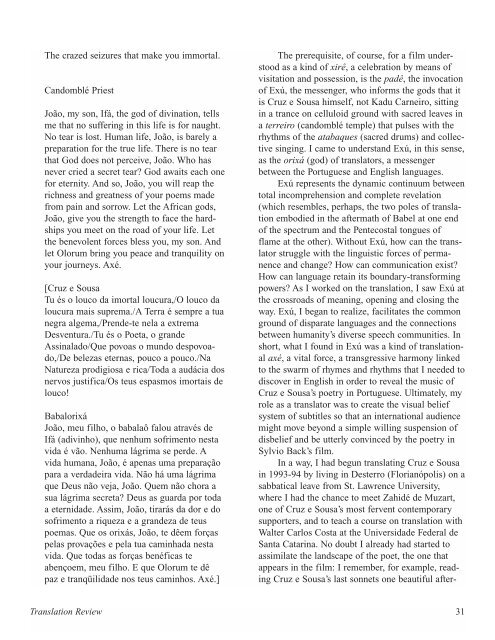Translation Review - The University of Texas at Dallas
Translation Review - The University of Texas at Dallas
Translation Review - The University of Texas at Dallas
You also want an ePaper? Increase the reach of your titles
YUMPU automatically turns print PDFs into web optimized ePapers that Google loves.
<strong>The</strong> crazed seizures th<strong>at</strong> make you immortal.<br />
Candomblé Priest<br />
João, my son, Ifá, the god <strong>of</strong> divin<strong>at</strong>ion, tells<br />
me th<strong>at</strong> no suffering in this life is for naught.<br />
No tear is lost. Human life, João, is barely a<br />
prepar<strong>at</strong>ion for the true life. <strong>The</strong>re is no tear<br />
th<strong>at</strong> God does not perceive, João. Who has<br />
never cried a secret tear? God awaits each one<br />
for eternity. And so, João, you will reap the<br />
richness and gre<strong>at</strong>ness <strong>of</strong> your poems made<br />
from pain and sorrow. Let the African gods,<br />
João, give you the strength to face the hardships<br />
you meet on the road <strong>of</strong> your life. Let<br />
the benevolent forces bless you, my son. And<br />
let Olorum bring you peace and tranquility on<br />
your journeys. Axé.<br />
[Cruz e Sousa<br />
Tu és o louco da imortal loucura,/O louco da<br />
loucura mais suprema./A Terra é sempre a tua<br />
negra algema,/Prende-te nela a extrema<br />
Desventura./Tu és o Poeta, o grande<br />
Assinalado/Que povoas o mundo despovoado,/De<br />
belezas eternas, pouco a pouco./Na<br />
N<strong>at</strong>ureza prodigiosa e rica/Toda a audácia dos<br />
nervos justifica/Os teus espasmos imortais de<br />
louco!<br />
Babalorixá<br />
João, meu filho, o babalaô falou <strong>at</strong>ravés de<br />
Ifá (adivinho), que nenhum s<strong>of</strong>rimento nesta<br />
vida é vão. Nenhuma lágrima se perde. A<br />
vida humana, João, é apenas uma preparação<br />
para a verdadeira vida. Não há uma lágrima<br />
que Deus não veja, João. Quem não chora a<br />
sua lágrima secreta? Deus as guarda por toda<br />
a eternidade. Assim, João, tirarás da dor e do<br />
s<strong>of</strong>rimento a riqueza e a grandeza de teus<br />
poemas. Que os orixás, João, te dêem forças<br />
pelas provações e pela tua caminhada nesta<br />
vida. Que todas as forças benéficas te<br />
abençoem, meu filho. E que Olorum te dê<br />
paz e tranqüilidade nos teus caminhos. Axé.]<br />
<strong>The</strong> prerequisite, <strong>of</strong> course, for a film understood<br />
as a kind <strong>of</strong> xirê, a celebr<strong>at</strong>ion by means <strong>of</strong><br />
visit<strong>at</strong>ion and possession, is the padê, the invoc<strong>at</strong>ion<br />
<strong>of</strong> Exú, the messenger, who informs the gods th<strong>at</strong> it<br />
is Cruz e Sousa himself, not Kadu Carneiro, sitting<br />
in a trance on celluloid ground with sacred leaves in<br />
a terreiro (candomblé temple) th<strong>at</strong> pulses with the<br />
rhythms <strong>of</strong> the <strong>at</strong>abaques (sacred drums) and collective<br />
singing. I came to understand Exú, in this sense,<br />
as the orixá (god) <strong>of</strong> transl<strong>at</strong>ors, a messenger<br />
between the Portuguese and English languages.<br />
Exú represents the dynamic continuum between<br />
total incomprehension and complete revel<strong>at</strong>ion<br />
(which resembles, perhaps, the two poles <strong>of</strong> transl<strong>at</strong>ion<br />
embodied in the afterm<strong>at</strong>h <strong>of</strong> Babel <strong>at</strong> one end<br />
<strong>of</strong> the spectrum and the Pentecostal tongues <strong>of</strong><br />
flame <strong>at</strong> the other). Without Exú, how can the transl<strong>at</strong>or<br />
struggle with the linguistic forces <strong>of</strong> permanence<br />
and change? How can communic<strong>at</strong>ion exist?<br />
How can language retain its boundary-transforming<br />
powers? As I worked on the transl<strong>at</strong>ion, I saw Exú <strong>at</strong><br />
the crossroads <strong>of</strong> meaning, opening and closing the<br />
way. Exú, I began to realize, facilit<strong>at</strong>es the common<br />
ground <strong>of</strong> dispar<strong>at</strong>e languages and the connections<br />
between humanity’s diverse speech communities. In<br />
short, wh<strong>at</strong> I found in Exú was a kind <strong>of</strong> transl<strong>at</strong>ional<br />
axé, a vital force, a transgressive harmony linked<br />
to the swarm <strong>of</strong> rhymes and rhythms th<strong>at</strong> I needed to<br />
discover in English in order to reveal the music <strong>of</strong><br />
Cruz e Sousa’s poetry in Portuguese. Ultim<strong>at</strong>ely, my<br />
role as a transl<strong>at</strong>or was to cre<strong>at</strong>e the visual belief<br />
system <strong>of</strong> subtitles so th<strong>at</strong> an intern<strong>at</strong>ional audience<br />
might move beyond a simple willing suspension <strong>of</strong><br />
disbelief and be utterly convinced by the poetry in<br />
Sylvio Back’s film.<br />
In a way, I had begun transl<strong>at</strong>ing Cruz e Sousa<br />
in 1993-94 by living in Desterro (Florianópolis) on a<br />
sabb<strong>at</strong>ical leave from St. Lawrence <strong>University</strong>,<br />
where I had the chance to meet Zahidé de Muzart,<br />
one <strong>of</strong> Cruz e Sousa’s most fervent contemporary<br />
supporters, and to teach a course on transl<strong>at</strong>ion with<br />
Walter Carlos Costa <strong>at</strong> the Universidade Federal de<br />
Santa C<strong>at</strong>arina. No doubt I already had started to<br />
assimil<strong>at</strong>e the landscape <strong>of</strong> the poet, the one th<strong>at</strong><br />
appears in the film: I remember, for example, reading<br />
Cruz e Sousa’s last sonnets one beautiful after-<br />
<strong>Transl<strong>at</strong>ion</strong> <strong>Review</strong> 31

















